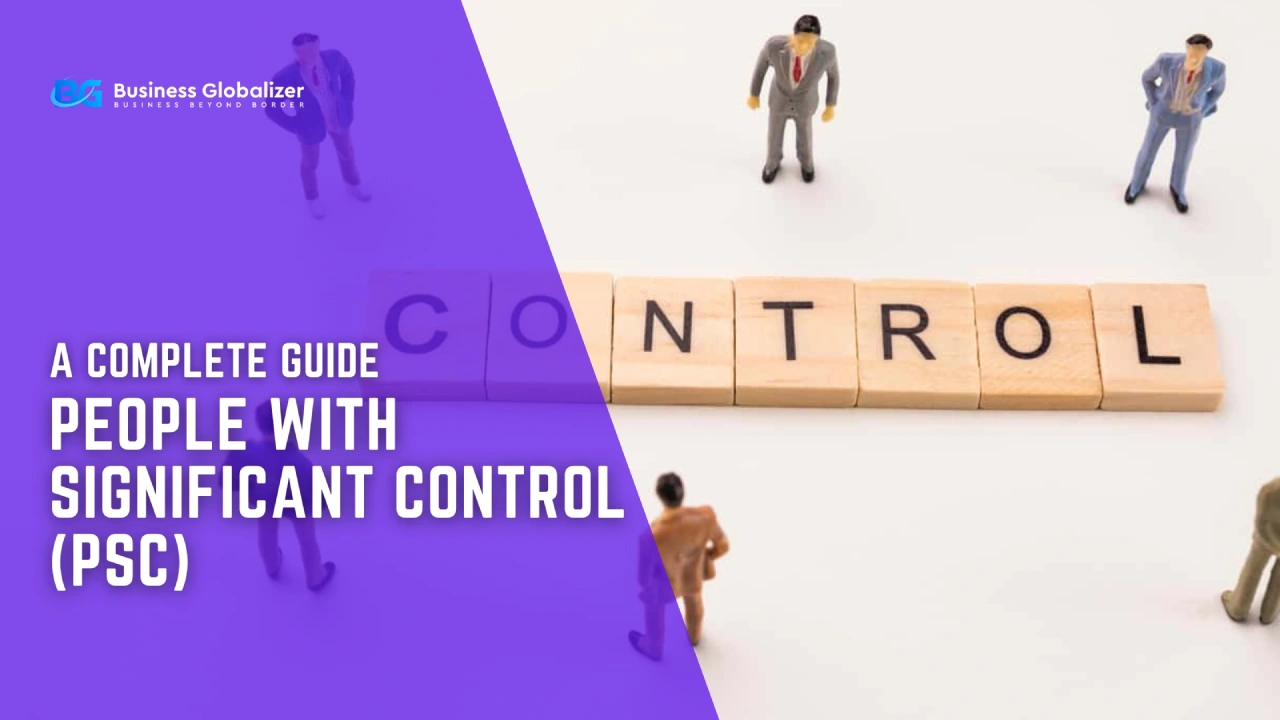You may have heard of PSC, which basically refers to People with Significant Control. Have you ever wondered what a PSC is? What do they do? Who can have this power of significant control, or how is it related to a company when doing business in the UK?
Wait a minute! Don’t be confused, as we are here to assist you. This blog will explain the ultimate guidance on “People with Significant Control” for your solid understanding.
Who Are People with Significant Control?
When some qualified individuals or legal entities have significant influence or control over a company—Limited or LLP—they are called “people with significant control” (PSCs). They are also called ‘the beneficial owners.
People with significant control disclosure has several benefits in that it enhances transparency, assists in preventing financial crimes and corruption, enhances accountability, strengthens corporate governance, it encourages investors’ confidence, and assists in statutory requirements within the business community.
There are also legal requirements in several jurisdictions for organizations to maintain a master list of its principals. These rules should be observed at the same time to ensure that one does not contravene the laws of the country. The number of PSCs can be one or more in a company. This could be you or someone connected to your company.
Do you know that all companies registered in the UK must maintain a PSC register? You will need to provide information about PSCs during company formation. Even if you don’t give this power to others or can’t’ identify your PSC, you still have to maintain it.
What Should a Company Do in the Case of a PSC?
In regards to Persons with Significant Control (PSC), there are several obligations stipulated by the regulators that companies must comply with.
- Identify PSCs: The officer must identify individuals or legal entities with significant control over the company. This involves confirming their information to establish their status as PSCs.
- Record Details: The identified PSCs’ information must be accurately recorded in the company’s PSC register within 14 days of identification. The company keeps this register as a record within the organization.
- Report to Companies House: According to regulations, the company must provide this information to the Companies House within 14 days of making the entry in its own PSC register. Companies House is the official corporate registry and official register in the United Kingdom.
- Timely Updates: Whenever there is a change in the information in regards to the PSC for instance in the instance of a change in ownership or control then the company must within 14 days of this change keep its own PSC register.
- Annual Confirmation: The company is supposed to verify to the Companies House every year the information present on the public register. It also sometimes requires the company to periodically confirm – a confirmation statement – to the Companies House that the details of the public register are up to date.
This confirmation is necessary at least once in every 12 months to keep the public record updated on PSCs.
To put it briefly, a company has to carefully register People with Significant Control, keep records, inform the state about significant changes, and update the People with the Significant Control Register. These regulations are a legal requirement and serve as the foundational step to promote transparency and integrity within the corporate governance system.

Is My Company Required to Keep a Register of People with Significant Control?
If your business meets any of these rules, you must keep a PSC list: If your business meets any of these rules, you must keep a PSC list:
- Companies Limited by Shares or Guarantees: Any company incorporated as a private limited company by shares, or a private limited company by guarantee, will be required to maintain a PSC register.
- Public Companies Limited by Shares or Guarantee (with Exceptions): Such companies have to maintain a PSC register under s790B(1) of the Act except those that fall under the stated exceptions.
Section 790B(1) states that Part 21A of the Companies Act 2006, which deals with people with significant control (PSCs), applies to all companies other than Section 790B(1) states that Part 21A of the Companies Act 2006, which deals with people with significant control (PSCs), applies to all companies other than:- Companies that can present authorized transactions in a managed market in an EEA Member State and have listed shares.
- Companies of any description that the Secretary of State has specified in the regulations.
- Unlimited Company: It is worth mentioning that limited companies are not the only entities obliged to keep a PSC register; An unlimited company is required to keep a PSC register too, irrespective of its structure.
- Societas Europaea (SE): Some others, which include SE or Societas Europaea also need to keep a PSC register.
- Dormant Company, Community Interest Company, and Charitable Company: Dormant companies, community interest companies, and charitable companies are all statutory companies that must maintain a PSC register.
However, if your company falls into any of the following categories, maintaining a PSC register is not required:
- Open-Ended Investment Company: An open-ended investment company does not have to comply with this requirement to maintain a PSC.
- Overseas Company: There is no such requirement, and it means that companies that fall within the S104 of 4 CA 2006 category of overseas entities have no legal obligation to keep PSC registers.
- Co-operative, Community Benefit, and Friendly Societies: We should note that there is no obligation to maintain a PSC register for certain types of businesses, including co-operative societies, community benefit societies, and friendly societies.
- Charitable Incorporated Organizations and Charity Trustees Incorporated as a Body Corporate: These charitable entities are now not required to keep the PSC register which is effectively mandatory.
- Unregistered Company: Even if a company does not register it has no legal requirement to keep a PSC register.
The business must adhere to the set guidelines in the particular area. The individuals who have got more questions on this may get their reply from one form of a lawyer or a consultant who majors in the laws of corporations in the UK.
Where Can I Find Information About People with Significant Control?
You are probably curious about where to find information about PSC, right? Details about a Person with Significant Control (PSC) can typically be found through various official sources and corporate documents, especially in the context of the UK. Here are the primary places to find information about a person with significant control:
- Companies House (UK): Companies House established a central public register for PSC information. This register includes information about shareholders or legal persons that majorly influence a company. This information is freely available through the Companies House website.
- Confirmation Statement: Another place where one can get the information concerning PSCs is in the confirmation statement. Companies House, under the new Companies Act, has mandated every UK company to disclose details about their PSCs in their confirmation statement. This is useful when trying to find PSCs.
- Company’s Website: Many companies must publish information about their PSCs on their official websites. This information is often included in the corporate governance section, including the company’s constitution or the annual reports. Check the company’s official site for relevant disclosures.
- Publicly Available Documents: Information about PSCs might be mentioned in various publicly available documents, including news articles, financial filings, or legal proceedings. For example, court documents related to the company’s legal cases could reveal details about its PSCs.
- Consider All Documents and Information: To find information about a Person with Significant Control (PSC) within your company, thoroughly review your company’s available documents and information. This includes:
- The register of members.
- Articles of association.
- Statement of capital.
- Shareholders’ agreements.
- Other relevant agreements (Company’s Constitution).
When researching a PSC, it’s crucial to ensure the information is obtained from reliable and official sources. Companies House, in particular, is a highly authoritative source for official records in the UK. Always cross-verify the information obtained from multiple sources to ensure accuracy and reliability.
How Can I Identify a PSC?
Based on the information above, you can examine a PSC. However, in the UK, determining a Person with Significant Control (PSC) within a company involves a systematic approach, considering the following key conditions known as the “nature of control”:
- Review Shareholdings: Begin by examining the company’s register of members to identify individuals or legal entities holding more than 25% of shares in the company.
- Assess Voting Rights: Examine both the register of members and the articles of association to identify individuals or entities with voting rights exceeding 25%, as these rights are often linked to shares.
- Consider Indirect Holdings: The first two conditions can occasionally be met indirectly if another company holds the rights. It’s essential to understand and assess such indirect holdings, with detailed guidance available on the official website at www.gov.uk.
- Examine Board Appointment Rights: It’s important to review the company’s constitution, including the articles of association, to pinpoint individuals with the right to appoint or remove the majority of the board of directors, especially in cases involving companies with a single director.
- Identify Significant Influence or Control: Sometimes, a person or entity can be considered a PSC without meeting the abovementioned conditions. In such cases, consider individuals or entities that exercise significant influence or control over the company, either directly or on behalf of someone else. This applies in specific circumstances and should not be overlooked.
Additional Consideration for Identifying a PSC:
- Evaluate Trusts and Firms: If a trust or firm without legal personality fulfills the first four conditions, it’s crucial to identify the individual with the authority to exercise significant influence or control over that trust or firm.
Examples of Identifying People With Significant Control Ltd.
- For instance, Cameli owns 100% of the shares of Company X Limited. The shares are attached to voting rights. This means Cameli qualifies as a PSC, and her details should be recorded on the PSC register with the appropriate percentage of voting rights and shares.
The company should check if Cameli has the right to appoint or remove the majority of directors and include this if appropriate.
Another example is the company “Y” Limited. Let’s say:
- Jack holds 75% of the shares, and Rose holds 25% of Company “Y” Limited.
- The shares come with the right to vote in shareholder elections.
- The company should also check if Jack and Rose have the right to appoint or remove the majority of directors and include this if appropriate.
In this case, Jack qualifies as a PSC. Their details should be recorded on the PSC register with the appropriate voting rights and share percentage. On the other hand, Rose is disqualified as a PSC as she doesn’t hold more than 25% of shares or voting rights.
After Identifying the PSC, What Should I Do Next?
After identifying a person with significant control (PSC) within your company, the following steps need to be taken to comply with the regulations:
Gather Required Information: As explained above, details about a PSC are usually accessible utilizing official databases and the Company’s documents. But which information do you need to allocate?
For a registerable PSC (individual), get the necessary information, such as
- Person’s name.
- Date of birth.
- Nationality.
- Service address.
- Usual residential address.
- Date the person became a registerable PSC, and
- Nature of PSC’s control over the company
- Which of the first three conditions for being a PSC the person meet, along with a quantification of the interest if needed.
For a Registrable Legal Entity, collect details such as;
- The name of the legal entity.
- The principal or registered office.
- The entity’s legal structure and governing law.
- The date it joined the company as an RLE.
- Which of the five PSC criteria is met, with quantification where applicable.
Submission to Companies House: Submit the gathered information to Companies House using either Form PSC01 or via the Companies House Web filing. This submission must be made within 14 days after the day that all of the required particulars have been confirmed.
A PSC must have the necessary confirmations, either from the person who provided or confirmed the information to the company, from someone else who knew that person and did it, or from a statement of initial significant control that subscribers who wanted to form the company sent to the registrar.
Failure to submit accurate information within the specified timeframe may result in legal consequences and financial penalties.
How to Register a PSC for the Company and When?
By following different processes, you can register a PSC for your company:
- Online Registration: Online filing is recommended to register a PSC for its speed and ease. The fastest and most practical way to register is online. You can file PSC details at Companies House through their official website.
This is often the preferred option for both efficiency and accuracy. It also reduces the risk of errors that can occur with paper filings. - By Post: Alternatively, you can register a PSC by post. Use the appropriate form for the type of PSC you are registering. Form PSC01 is used for individual ‘natural person’ PSCs, while Form PSC02 is used for Registrable Legal Entities (RLEs).
There are two different times when registering a PSC is required:
- During Company Formation: Firstly, if you consider the process of registering a new company, you will have to include PSC details in the company formation application form. Make sure to provide the necessary details regarding the PSC throughout the initial registration procedure.
- After Incorporation (if applicable): Incorporation Company Before or After PSC: – If your company was incorporated before the above statutory requirement came into effect on the 6th day of April 2016 or must be completing the PSC registration after incorporation then you must provide the PSC information to Companies House as soon as possible.
Required Details for People With Significant Control in the Companies House Account Updating
The following details are needed for People with Significant Control (PSC) in the Companies House account update:
- Full name.
- Date of birth.
- Nationality.
- Country of residence.
- Service address.
- Nature of control over the company.
Anytime there is a change in anything concerning your PSC such as personal details or nature of control then all these have to be amended in the company’s PSC register. This can be done within 14 days after the change. You have 14 more days to file these changes with Companies House.
Is It Required to Maintain People with Significant Control Responsibilities?
Once the decision is taken, who will be the PSC? The tasks are yet to be done from the side of a PSC holder. The duties and responsibilities of a Person with Significant Control (PSC) in the UK include:
- Providing Accurate Information: The company must also ensure that it receives the right information concerning the identities of PSC holders such as name, date of birth, nationality, and nature of control concerning each PSC holder.
- Updating Information: PSC holders must update the company within 14 days if there are changes in their details or level of control.
- Cooperating with the Company: PSC holders must cooperate, providing necessary information and documents for compliance.
- Ensuring Transparency: An individual holding PSC is crucial in maintaining clarity about the ownership and control of a company.
Consequences for a Company Not Having a Person With Significant Control
An entity that fails to employ an individual as PSC or commence Inquiry but fails to determine one is obliged to preserve the PSC register. The register could not be left blank.
It is your responsibility to renew the confirmation statement with the Companies House every year. In this statement, you will confirm that your PSC register either holds the information of PSC or explains that there are no PSC records.
With these, you are able to fulfill the legal requirement to keep a PSC register, and if it shows that there are no Persons with Significant Control in your company, you are correct.
What Will Happen If the Conditions Aren’t Met?
In the case of the PSC conditions not being fulfilled, you risk facing some legal repercussions that can be pretty severe. The section 992 of the companies act highlights the provision of inaccurate data in the PSC register or failure to adhere to notices that request for information as illegal.
Those in violation of the rules risk being penalized with financial sanctions or even jail term of up to two years. Thus, it is critical for any business that adheres to PSC regulations to keep necessary records and send the demanded information on schedule to avoid these legal effects and guarantee clarity in company ownership and governance.
How Business Globalizer Can Help You?
Business Globalizer provides a comprehensive range of business legal services, including registration for PSC in a detailed company formation package.
We can help you by organizing the paperwork required for registration of the PSC as well as collecting information regarding the PSC on your behalf. This will help us see to it that your firm complies with all the company formation laws and regulations. This includes ensuring that the documentation of the PSC is properly carried out as stipulated in the laws of the jurisdiction.
FAQs
Q1: Is there any alternative to people with significant control?
Answer: No. However, a few alternatives exist to the term “people with significant control (PSC).” These alternatives include:
- Beneficial owners.
- Ultimate beneficial owners.
- Controlling individuals.
- and people with ultimate control.
Q2: Can I have more than one person with significant control?
Answer: Yes, a company can have more than one PSC.
Q3: Is the CEO considered to be a person of significant control?
Answer: According to the company’s shareholding structure, a CEO may not always be the person with considerable control. If the CEO can nominate or dismiss most board members or possess over 25% of the voting rights and shares, they may be a PSC.
Bottom Line
In a nutshell, the PSC regulations are indeed significant for any company operating within the UK. This assists in reducing and or preventing financial crimes as well as ensuring proper corporate governance by indicating the individuals or entities that have substantial power or ownership of the business.
If you have any questions related to the PSC regime for your business or whether you have all the requirements and regulations fulfilled, please do not hesitate to contact us. If you need any further information feel free to contact us.






